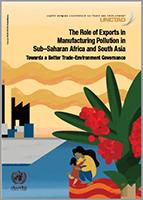
The Sustainable Manufacturing and Environmental Pollution (SMEP) programme has been established by the Foreign, Commonwealth and Development Office of the United Kingdom of Great Britain and Northern Irelandand is implemented in partnership with UNCTAD.
In this context, this study prepared by the Instituto 17, called “The role of exports in manufacturing pollution in sub–Saharan Africa and South Asia: towards a better trade-environment governance”, herein referred to as “study”, or “report”, considers the role of exports in driving pollution in selected manufacturing sectors in four specific countries located in Sub-Saharan Africa (SSA) and South Asia.
The report aims to understand how the group of the SMEP target countries located in Sub-Saharan African (SSA) and South Asia have participated in the global trade, specifically investigating the role of trade in manufactured goods. They correspond to thirteen countries, of which ten are in SSA, namely the Democratic Republic of the Congo, Ethiopia, Ghana, Kenya, Nigeria, Rwanda, Senegal, Uganda, the United Republic of Tanzania, and Zambia, and three are in South Asia, namely Bangladesh, Nepal, and Pakistan.
The analysis relies on access to secondary data availability and Life Cycle Assessment (LCA) that estimates the impacts on the local environment associated with manufacturing pollution. This trade analysis helps guide the choice of export-oriented manufacturing sectors to be assessed in the case studies of four countries: Kenya, the United Republic of Tanzania, Bangladesh, and Pakistan. Furthermore, Regional Trade Agreements (RTAs) and public environmental governance may play an important role in improving pollution management. Therefore, the report identifies environmental and social challenges and gaps from public and private governance initiatives to control the pollution of manufacturing exports for these four countries.


